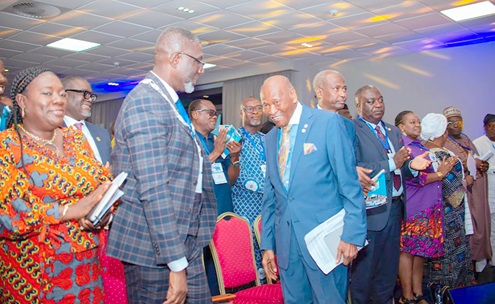
Engineers must aid nation’s energy transition agenda
Speakers at the 54th Annual General Meeting (AGM) and Conference of the Ghana Institute of Engineering (GhIE) have encouraged engineers to develop innovative strategies to support Ghana in implementing its energy transition plan and achieve a sustainable future.
That, they said, was because Ghana’s infrastructural development and economic growth would be heavily dependent on the energy used for industrialisation since the countries with high-GDPs exhibit significant energy usage.
Therefore, they said Ghana must fully harness its energy consumption for growth while still taking appropriate decarbonisation steps towards achieving the sustainable development goals.
Event
The AGM was held in Accra from March 18 to 22, 2024 on the theme "Engineering a Resilient Future: Innovative Solutions for a Sustainable Ghana.”
It brought together numerous engineers, industry professionals, academics, experts, and policymakers from across Ghana and other African countries, namely Nigeria, Sierra Leone, Kenya, Liberia, and South Africa, to discuss and share insights on the applications of technological innovations and artificial intelligence in providing engineering solutions to facilitate developments in various sectors of the economy for a resilient future.
The conference featured keynote speeches, technical sessions, exhibitions, and panel discussions, covering a broad range of topics on innovative engineering solutions for resilient national development.
Other activities included the 25th Anniversary Launch of the Women in Engineering (WINE), the Artisans Forum, the Young Engineers Forum, Engineering Excellence Awards at a Banquet Dinner, and visits to some selected engineering firms within Accra, which provided a great opportunity for networking and relaxation.
Development
In order to fast track the development of the nation, the speakers called for policymaking to be based on sound engineering advice where there would be engineering considerations for all public projects and initiatives in all sectors of the economy.
They also called for incentives for commercialisation of engineering innovations to encourage more industry -academia collaborations for research and development to generate solution-driven innovative technologies to address challenges in urban planning and drainage systems, housing, waste disposal, agriculture, and water supply in the country.
“Ghana must prioritise AI by paying particular attention to the three key enablers of AI, i.e infrastructure, data, and talent, to fully benefit from it. The GhIE will, henceforth, work with the universities to ensure inclusion of AI in all engineering and professional development programmes,” they added.
They urged engineers to develop a resilient future involves designing systems, infrastructure, and technologies that can withstand and adapt to various challenges through resilient engineering infrastructure, cities, economic transformation, and social inclusion.
Collaboration
A member of the Council of State, Sam Okudjeto emphasised the critical role of engineering in national development and the need for engineers to collaborate and come up with solutions to address the many challenges in society.
Mr Okudjeto, who was the Special Guest of Honour for the event, also encouraged engineers to be bold and courageous in the implementation of projects and not be persuaded by influence from people in authority against their professional ethics.
The President of GhIE, Kwabena Bempong, stated that the institution recognised the need to include resiliency in its aspirations and ensure that engineering practitioners provide innovative solutions, hence the theme.
